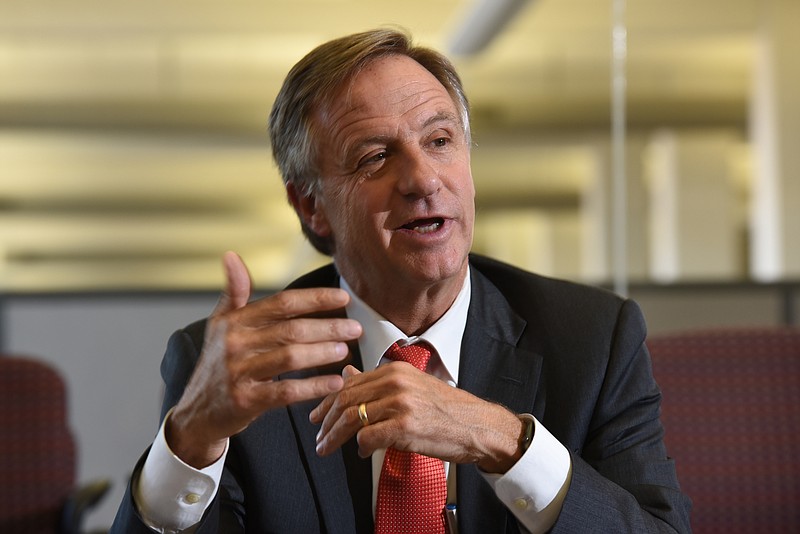NASHVILLE - A key feature of Gov. Bill Haslam's tax reductions in his proposed IMPROVE Act - a cut worth $113.3 million to Tennessee manufacturers - would benefit 518 companies, according to an administration analysis.
Twenty-four large manufacturers would see annual reductions of $1 million or more in their state franchise and excise taxes, according to the analysis obtained by the Times Free Press and verified by two legislative sources. Those tax breaks would account for $57.44 million, or 50.7 percent, of the total $113.3 million.
Another 145 companies would see tax cuts between $100,000 and $1 million, for a collective reduction of $47.95 million. All told, 93 percent of the proposed change, or $105.4 million, would go to companies that would save $100,000 or more. Some 349 smaller companies would share a $7.89 million reduction., according to the analysis.
The franchise and excise tax cut is among three in Haslam's plan to boost gas and diesel taxes for transportation spending.
The Republican governor also proposes a 20 percent cut in the state's sales tax on groceries, which affects nearly all Tennesseans, and lowering the Hall tax on investment income.

Haslam said the manufacturers' tax cut is aimed at encouraging existing companies to boost investment and new ones to locate to Tennessee by letting them choose the formula for calculating their franchise and excise tax burden.
"As the governor said during the State of the State [address], this is about prospective businesses and making Tennessee more competitive as we're out recruiting new jobs to the state," press secretary Jennifer Donnals said last week in an email when asked about the analysis.
"But also," Donnals noted, "these are companies that have invested in Tennessee with property and payroll. With this option, manufacturing companies, which bring a long trail of supplier jobs with them, could invest MORE in Tennessee in property and payroll and not risk increasing their F&E taxes unless their Tennessee sales increased."
But some Republicans, especially in the House where opposition to the fuel tax increases runs strong in some quarters, object to efforts to combine the fuel tax increases and cuts elsewhere in one bill.
"Here's what I'm opposed to," Rep. Jerry Sexton, R-Bean Station, recently said in a news conference with other critics.
"I'm opposed to the hardworking men and women of Tennessee having to make up for that franchise and excise tax. That's what I'm opposed to. I'm opposed to having to make up at the gas pump for that Hall income tax."
Supporters of the fuel tax proposal argue that a tax increase of 6 cents per gallon on gas and 10 cents for diesel would be more than offset by slicing food taxes from 5 percent to 4 percent, a $120 million savings. Higher fuel taxes would raise more than $100 million for cities' and counties' local road programs.
House Budget Subcommittee Chairman Gerald McCormick, R-Chattanooga, who pushed hard for the food sales tax cuts, supported the proposed change in franchise and excise taxes for manufacturers.
"I would just say that I'm glad to hear that, because these are the same exact companies that will hire hard-working men and women in Tennessee at good-paying manufacturing jobs," said McCormick, whose district includes the Volkswagen assembly plant in Chattanooga.
"These are jobs, not for CPAs, lawyers and white-collar, these are for people who work in factories," McCormick said. "That's just an added bonus and I predict it will be thousands of jobs" generated.
He noted that Collegedale-based McKee Foods also would benefit. The company, whose products include Little Debbie cakes and pies, chose a few years ago to expand a production plant in Virginia rather than the Chattanooga area due to more favorable tax treatment.
Moreover, McCormick noted, "We just recently lost a megasite prospect in West Tennessee, a good prospect out there, strictly because of our tax system on the F&E taxes."
The analysis does not identify specific companies impacted. State law prohibits public disclosure of most taxpayer information.
Last week, House Transportation Committee Chairman Barry Doss, R-Leoma, who is handling Haslam's bill, told McCormick's panel the measure's tax cuts total $428 million, compared to $350 million worth of increases.
Doss said the average Tennessean with two cars would spend an additional $5.54 a month on gas but save $7.72 on grocery store food purchases. Even with a $5 increase in car registration fees, the average state resident would come out $1.35 a month ahead.
House Republicans who oppose putting the tax reductions and increases in the same bill also point to the $1 billion in the state's general fund.
"It's just not feasible in my mind to raise taxes given the amount of budget surplus that we've got," Sexton said Saturday.
***
The three-factor franchise and excise tax formula is based on property, payroll and receipts from sales. It's apportioned to reflect activity outside the state.
Sales currently are triple-weighted and that affects McKee and companies such as Volkswagen, Smyrna-based Nissan and General Motors in Spring Hill, which export most of the vehicles they make here outside the state.
Haslam's plan is to let manufacturers choose whether to go to a single sales factor and not count property, which includes plants and machinery as well as employee payroll, to determine their taxable activity.
Fuel taxes in Tennessee haven't been raised since 1989. Haslam and others argue new revenue is needed to tackle a $10.5 billion backlog of projects.
With a divided caucus on the tax tax issue, House GOP members hope to unveil their own road-funding plan this week with the help of Republican House Speaker Beth Harwell of Nashville, who is expected to run for governor.
As of late Friday, it is expected to call for diverting a good portion of existing sales taxes on new and used vehicles to highway projects.
Contact Andy Sher at asher@timesfreepress.com or 615-255-0550. Follow on twitter @AndySher1.
